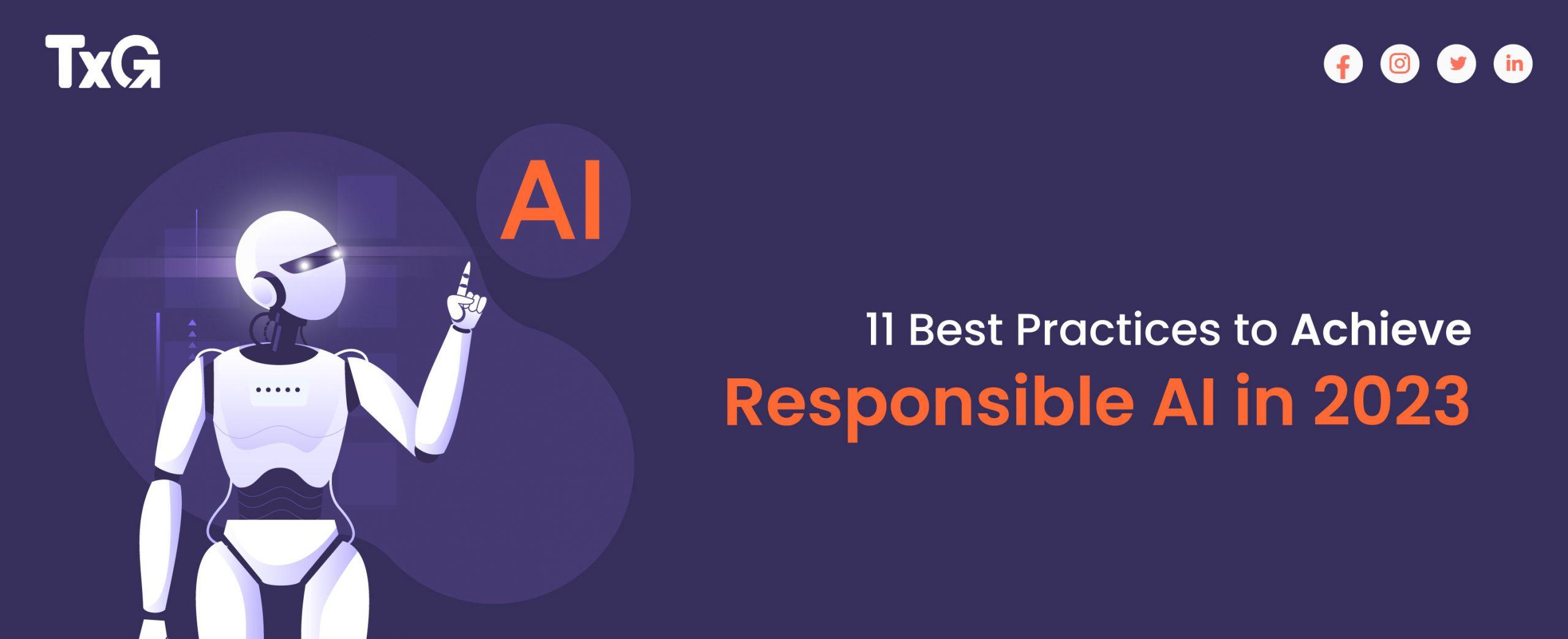As artificial intelligence (AI) continues to permeate various aspects of our lives, ensuring its responsible and ethical deployment has become paramount. The rapid advancement of AI technology brings both incredible opportunities and potential pitfalls. To harness its benefits while minimizing risks, it’s essential to adopt responsible AI practices. In 2023, here are 11 best practices that organizations and AI practitioners should consider:
- Transparent Documentation:
Provide clear and detailed documentation about the AI system’s design, purpose, and limitations. Transparency fosters understanding among stakeholders and helps to manage expectations.
- Data Privacy and Consent:
Obtain explicit consent when collecting and utilizing personal data. Prioritize data privacy and employ anonymization techniques to protect user identities.
- Fairness and Bias Mitigation:
Regularly audit AI models for biases in training data and algorithmic outputs. Employ techniques like fairness-aware learning to ensure fair treatment across different user groups.
- Human Oversight:
Maintain human involvement in critical AI-driven decisions. Humans can provide context, empathy, and ethical judgment that machines may lack.
- Continuous Monitoring:
Implement systems to monitor AI applications in real-time. This enables prompt identification and mitigation of any unexpected behaviours or adverse outcomes.
- Accountability and Responsibility:
Assign clear roles and responsibilities for AI system development, deployment, and maintenance. Establish accountability to avoid diffusion of responsibility.
- Robust Security Measures:
Prioritize cybersecurity to safeguard AI systems from unauthorized access and malicious attacks. A breach in AI security can have far-reaching consequences.
- Societal Impact Assessment:
Conduct thorough assessments to understand potential societal impacts before deploying AI systems. Consider economic, cultural, and ethical ramifications.
- Lifelong Learning Models:
Develop AI models that can adapt and learn over time. This ensures that AI systems remain relevant and accurate as new data becomes available.
- Collaboration and Knowledge Sharing:
Promote collaboration among researchers, organizations, and policymakers. Openly share insights, successes, and challenges to collectively advance responsible AI practices.
- Ethics by Design:
Integrate ethical considerations into every stage of AI development. From concept to deployment, prioritize the ethical implications of design choices.
Conclusion
The responsible and ethical use of AI requires a holistic approach that involves not only technical experts but also legal professionals, ethicists, and representatives from diverse communities. In 2023 and beyond, embracing these best practices can help ensure that AI remains a force for good, enhancing our lives while upholding fundamental values. By building responsible AI systems, we pave the way for a more inclusive, transparent, and harmonious future.
How can we help you?
We can collaborate with businesses to develop an AI strategy that aligns with their goals and values. This involves assessing their specific needs, identifying areas where AI can be responsibly integrated, and outlining a roadmap for implementation.
Our team of experts can ensure that AI systems are designed with ethics in mind. This includes incorporating fairness and bias mitigation techniques, as well as creating AI models that are transparent, interpretable, and accountable. We can help businesses implement AI systems that adhere to ethical standards and regulations.
To address data privacy and security concerns, we can provide robust solutions for collecting, storing, and utilizing personal data. This includes implementing encryption, anonymization, and access control measures to protect sensitive information from unauthorized access and breaches.
We can design and implement real-time monitoring systems to track the behavior of AI applications. This proactive approach allows us to identify any unexpected outcomes or biases quickly and take corrective actions. Additionally, we can provide ongoing maintenance to ensure AI systems remain accurate, relevant, and secure over time.
By partnering with us, businesses can leverage our expertise to navigate the complexities of responsible AI implementation. We offer tailored solutions that not only align with industry best practices but also meet the specific needs and objectives of each organization. Through collaborative efforts, we can contribute to building a responsible AI ecosystem that benefits both businesses and society at large.

